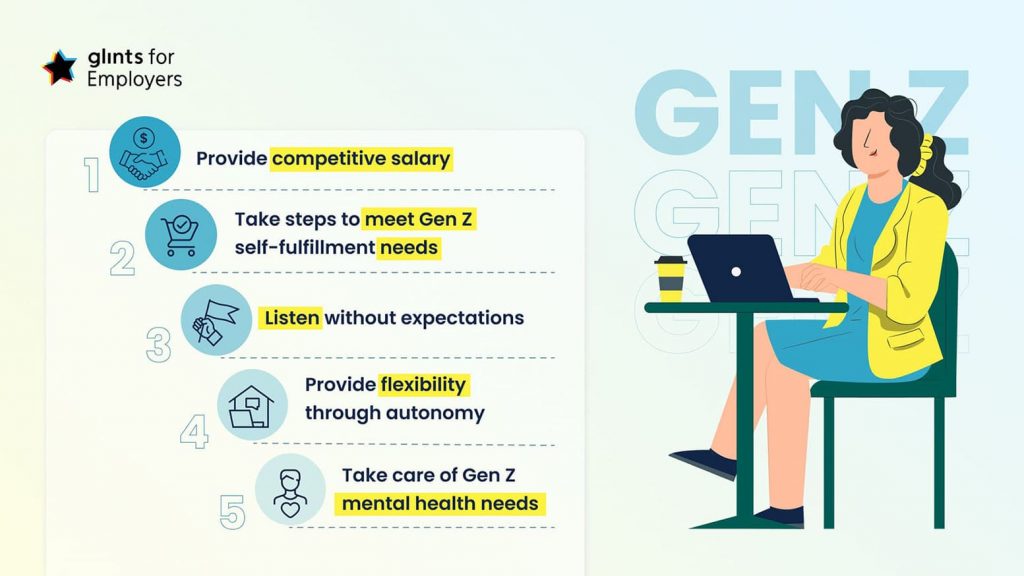Cracking the stereotype: Are employers doing enough to retain Gen Z talent?


Generation Z (Gen Z) is the youngest generation of people who are in the workforce. The age group includes those born between 1997 to 2012, according to the Pew Research Center. Despite their young age, Gen Zs will form 25% of Asia’s population by 2025 and will no doubt be an influential generation within the tech talent ecosystem in the future.
However, they’re also plagued by stereotypes given by the older generations. Words such as ‘job-hopping’ are plastered around a lot to describe them. A LinkedIn study showed that Gen Zs are changing their jobs at a rate of 134% higher than in 2019.
What are the reasons behind this trend? The truth is — like talent from previous generations — employers must ensure they properly understand their motivations and needs to retain them in their organizations.
We spoke to the co-founder of the FinTech startup BlueMeg, Paul Du Long, together with two Gen Zs to find out more about their views on this budding workforce. The names of the two Gen Z individuals were replaced under the condition of anonymity.
Table of Contents
ToggleRegina, a 24-year-old recruitment consultant from a tech startup, observed the job-hopping phenomenon while screening through her peers’ resumes. She added that age is the biggest advantage that Gen Zs have. It’s the best time for them to be exposed to new experiences and find out what they like as a career.
Sometimes, it’s essential to job hop. However, the idea of job hopping must be looked at objectively since it depends on many different factors and is considered a “gray zone” for both employers and Gen Zs.
“I would say that talent (who job hop) is still worthy to be considered by potential employers, especially if they stay in an organization for at least a year. However, if they, for example, change their jobs four times during that period, it is alarming; even for me as a recruiter,” shared Regina.
However, Maria — a 23-year-old global bank employee — doesn’t consider herself or her Gen Z peers as job hoppers. She is aware that having short stints in companies, about two to three months, doesn’t reflect well on resumes. However, other factors might cause the Gen Z to leave their jobs during this period. She reasoned that they would usually have a legitimate reason such as working in a bad environment or realizing that it’s not a job they wanted.
Du Long, the co-founder of BlueMeg — an entity management startup that aims to transform corporate governance — shared that there is currently a wider range of choices when it comes to finding a job. He is a millennial who has hired Gen Zs into the organization previously.
Social media, for example, has imprinted on Gen Zs that they should look out for more experiences in jobs rather than staying with an organization for a long period. He is not against the idea of Gen Zs job-hopping, but cautioned that it is a dangerous practice in the long term.
“If you do things, you need to bring something to the table for the company too. They (Gen Z) have to be tactical about it,” he added.
Despite the mixed opinions on the Gen Z job-hopping phenomenon, there is one thing that is certain: employers who would like to retain their Gen Z talent and minimize instances of them leaving their organization must be proactive.

Like what you see? Subscribe to our newsletter to receive all our latest news and offers delivered right to your desk.
A report by Handshake highlighted that 70% of Gen Zs prioritize salary first. Additionally, a study by Deloitte about Gen Z concerns showed that high cost of living was the top worry in their minds. This awareness gives them a better picture of where they stand, urging them to be calculative about their approach to finding a job. Hence, it’s important for employers to take into consideration Gen Z pain points before deciding on a salary that both parties mutually agree on.
“Drawing a salary of SGD$2,000 is no longer sufficient … The biggest challenge of finding a job during the pandemic was really whether to lower our expectations for a lower-paying job. Because the harsh truth is, the moment we start with a lower salary, it takes years for us to get to the ideal starting point that we want,” elaborated Regina.
Gen Zs are acutely driven by a sense of self-fulfillment at work. They would rather shine as individuals who find meaning in their jobs. Their generation came of age during the Covid-19 pandemic and now they battle inflation and the impending recession. These factors give them a lot of time to think about what really matters to them. The result? Gen Zs now prefer work that aligns with their personal values and beliefs.
In fact, 41% of them would love to work in an organization that engages in a social cause they support. Employers need to be cognizant of their employer branding. How an employer brings forth its corporate social responsibility and values will affect the retention of Gen Zs.
Flexibility by way of autonomy allows the Gen Z to navigate their work effectively. Employers have to understand that they have their own working style. There are those who prefer to work remotely while others prefer a hybrid setting. It doesn’t matter how they work, as long as they complete their assignments. For previous generations, a flexible workplace was considered a perk. For the Gen Z however, having flexibility at work is something that is compulsory to them since they grew up in an age where remote or hybrid working models have become the norm.
Aside from hybrid work conditions, they would also like to be given room to expand their skill sets related to their job, but at their own pace. Gen Zs need to know that such avenues for growth exist within an organization.
“There are some companies that force down a requirement for your (Gen Zs) learning journey. When it’s a requirement for you, it can be stressful,” said Maria. “It’s better for us to have a platform where we can access when we want to self-learn.”
Both Regina and Maria emphasized the importance of mental health in the workplace. A study by HealthMatch concluded that 90% of Gen Z have experienced some form of psychological or physical symptoms because of stress in 2021. Creating a culture of mental health awareness and transparency will help in making Gen Zs feel included and secure in an organization.
For example, employers can initiate partnerships with wellness companies and introduce mental health sessions. Another way is by giving them mental health days, which 82% of Gen Zs find important.
“Gen Zs need to be heard. They are not people who silently walk in the background, hoping that they get recognized,” explained Regina. “They value management that allows them to speak up, take initiative, and be recognized.”
As an employer, Du Long agrees that there is a need for organizations to change when it comes to dealing with Gen Zs. Employers cannot act as helicopter parents. Rather, it’s best to create a safe environment where there is freedom for them to grow and speak up on issues that are important to them. These ideas might be useful in the long run.
“There needs to be a buffer time to internalize these ideas for both parties,” explained Du Long. “This allows the employers to sink in on the idea and give them time to decide the next course of action. In the meantime, the Gen Z can reflect on the given idea and sharpen it.”
It’s not always easy to navigate the needs and motivations of the Gen Zs. It may be harder still for employers who belong to the older generation. Despite the challenges, it’s necessary to keep an open mind, provide sufficient resources and foster a healthy environment for Gen Zs to bloom. If you take the time to nurture them — and facilitate their needs — you’ll be positively surprised at how their fresh energy can positively impact your organization in the long run.
.
Build your workforce from anywhere. Start your remote hiring journey with Glints.
This article is brought to you by Glints TalentHub. Leading companies are actively building their borderless teams in Southeast Asia, Taiwan, and beyond. However, the prospect of going borderless can be daunting due to complex regulations and cultural ambiguities. With Glints TalentHub, you’ll have a dedicated team of in-market legal, HR, and talent experts by your side at every step of the way.
Glints TalentHub offers an end-to-end, tech-enabled talent solution that encompasses talent acquisition, EOR, and talent development. We empower businesses to leverage the strengths of regional talent efficiently to build high-performing, cost-efficient teams.
Schedule a no-obligation consultation with our experts to receive a tailored proposal today.